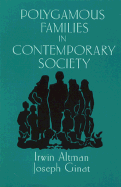Book contents
- Frontmatter
- Contents
- Foreword
- Preface and acknowledgments
- 1 Introduction
- Historical background
- Early stages of relationships
- Home environments of plural families
- Managing everyday life
- Social-emotional and family relationships
- Appendix A Methodology and procedure
- Appendix B Demographics of Mormon polygyny
- Notes
- References
- Index
Preface and acknowledgments
Published online by Cambridge University Press: 05 May 2010
- Frontmatter
- Contents
- Foreword
- Preface and acknowledgments
- 1 Introduction
- Historical background
- Early stages of relationships
- Home environments of plural families
- Managing everyday life
- Social-emotional and family relationships
- Appendix A Methodology and procedure
- Appendix B Demographics of Mormon polygyny
- Notes
- References
- Index
Summary
Our work on this book began quite coincidentally and accidentally. In 1986 Gloria and Irwin Altman were in Israel attending a conference, having also previously arranged to spend some social time with Dalia and Joseph Ginat. The Ginats and Altmans had been casual acquaintances in Utah in the 1970s, during the time that Joseph was completing his Ph.D. in anthropology and Irwin was a faculty member in psychology at the University of Utah. Over the course of many social occasions when the Ginats hosted the Altmans in Israel, we decided to collaborate on a study of family life among Mormon fundamentalists who espoused and practiced polygamy. During his years in Utah, Joseph had become acquainted with members of fundamentalist groups, many of whom he and Dalia visited in their homes and communities, and several of whom spent time with the Ginats in Israel.
We originally planned a small-scale study of relationships between husbands and wives, and between wives, in modern plural families. But once begun, the project grew and grew, our interest and commitment mounted, our relationships with fundamentalist families deepened, and the work expanded into a decade-long effort. This book is the story of what we learned and also reflects the intellectual perspectives, collegiality, and close personal relationships of the Altmans and Ginats with one another, and with the families who participated in the work. There are several reasons for studying polygamous families in contemporary society.
- Type
- Chapter
- Information
- Polygamous Families in Contemporary Society , pp. ix - xviPublisher: Cambridge University PressPrint publication year: 1996

